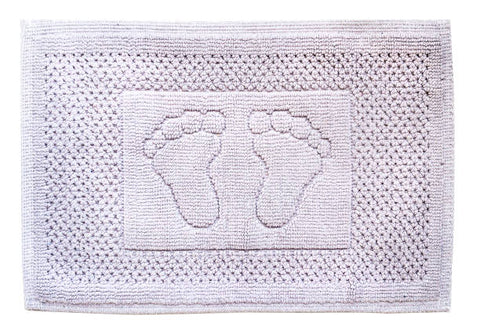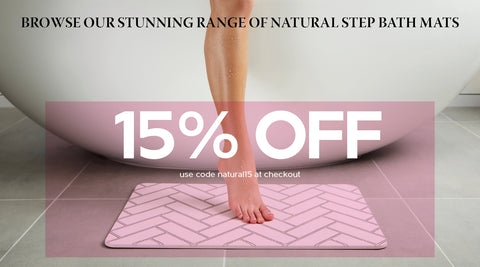
Are cotton bath mats a good choice?
Cotton is the traditional choice for a bath-mats, but is it the best option? This article considers every aspect of the products performance, price and environmental impact and answer some commonly asked questions.
Cotton is used to create lots of different fabrics, from denim to corduroy. When you think of a cotton bath mat, you probably think of standard or more luxurious Egyptian cotton, but there are at least 7 types of cotton used in bath mats.
- Upland cotton (standard cotton)
- Egyptian cotton
- Indian Cotton
- Pima Cotton
- Turkish cotton
- Bamboo blends
- Synthetic blends
Environmental impact of cotton bath mats
Cotton has a particularly concerning environmental impact. Although cotton production covers only 2.5% of the total agricultural space on earth, it uses 16% of all insecticides and 7% of all pesticides. These toxic chemicals are released into the environment and have harmful effects on agricultural workers health and ecosystems. Cotton production is responsible for biodiversity loss and declines in soil fertility which means the land loses its ability to support plant life.
Organic Cotton
Organic cotton is less likely to cause acidification, eutrophication and global warming. Buying organic cotton bath mats means helping with soil fertility and biodiversity. There is also the problem of labelling and certification, as organic cotton fetches a premium price, non-organic products are sometimes unscrupulously labelled as ‘organic’ to fetch a higher price. Look for GOTS 'organic' certified products to make sure the bath mat is made of organic cotton.
It is worth noting that an organic cotton bath mat may have a larger carbon footprint that a standard cotton bath mat because organic cotton has a lower yield, so more land, water and energy are used to produce it.
Washing and drying
Cotton bath mats require machine washing and often drying when its cold and wet outside, as they are heavy and take up a large part proportion of household washing. In fact, in a house with 5 people with 2 mats, they could potentially use 250 kw/hours of electricity and generate 50kg co2 a year which is the same as driving a car 260 km. This also adds as much as £67 a year to household bills.
Can you recycle cotton bath mats?
At the end of life, a cotton bath mat can be recycled as long as it is taken to a textile recycling location not put in the household waste. It is separated by colour, shredded into crude fibre and then re-spun back in to yarn. Recycling cotton is said to save up to 765,000 litres of water per tonne produced!
It’s important that we look to reduce the use of high carbon emitting, environmentally damaging materials in the first place and recycling is just a last resort. It’s an imperfect system and something of a lottery as to what ends up getting recycled and what doesn’t.
Without preachin, if the environment is your priority, and it should be everyones, then cotton is not the right choice of material for your bath mat given the alternatives.
Are cotton bath mats absorbent?
Cotton bath mats soak up the water quickly and higher quality cottons like Egyptian, Turkish and Pima are all more absorbent than regular cottons due to their longer fibres.
How fast do cotton bath mats dry?
Again, Egyptian and Turkish cotton bath mats dry quicker than standard cottons. The fabric is more porous, so air passes through it, helping it to dry. That said, all cotton bath mats suffer from over saturating and need to be lifted up and put on the washing line or radiator to dry.
Are cotton bath mats sanitary/hygienic?
The main drawback of cotton bath mats is that they are breeding grounds for bacteria. The damp conditions are the perfect incubators, so like wet towels, without regular washing and drying they can easily pass infections between users.

Are cotton bath mats good for babies?
Choose organic cotton which is free form pesticides and herbicides so naturally hypoallergenic and soft on a baby’s skin. Baby’s will appreciate the softness and comfort. That said its probably not necessary to have a bath mat for a baby as you will be lifting them straight into a warm towel. Cotton is not the best choice for adults. Remember the best thing we can do for the planet and future of our children is to consume less!
How to wash cotton bath mats?
How often?
It’s always advisable to wash new bath mats before using, this will take away the stiffness and bacteria that may have formed while packaged in hot, humid conditions. The frequency you wash your cotton bath mats will depend on your household. If you play a lot of sports or have a large active family who are in and out of the bath and shower, you are going to want to launder regularly, if there a just a couple of you in the house, once a week will be ok as long as you are drying them outside or on the radiator in between. Bacteria, mildew and fungi forms very quickly in damp conditions.
How to wash?
Before washing your bathroom rugs, check the care this will guide you as to the settings for your washing machine and any specific care instructions. Most cottons need cleaning at 40 degrees or below to prevent shrinkage and colour run. If you do have to use the tumble dryer, please set to the lowest heat.
Pre-Wash
Before washing always take the cotton bathroom mats outside and give them a shake, you’d be surprised the amount of dust and debris deposited on them. Removing this before washing, will ensure a longer life for your washing machine. It this mat has a plastic backing, please wipe this down first, checking for any cracks or damage. If there is damage it may be time to replace the mat before this backing detaches in your washing machine causing costly damage.
Avoid fabric softeners
Although, they smell nice, they can change the PH level of the water which will reduce the bath mats absorbency.
Avoid chlorine bleach
It’s a great stain remover but it will reduce the life of your mats by weakening the fibers. Use an Oxygen-based bleach/whitener or spot-treat the stains.
Eco-friendly cleaning tips
Use vinegar in the occasional wash load, this increases absorbency by changing the water Ph and can remove musty, damp smell. Baking soda can also be used in this way.
Durability and Safety of cotton bath mats
More expensive cottons in theory should last longer. The longer fibres provide additional durability. Manufacturers of Pima cotton say that it has a 50% longer life expectancy comparing to other cotton products.
To provide safety, cotton bath mats need to be backed with another non-slip synthetic material. This is often rubber which tends to break down over time when machine washing, causing issues with your washing machine. So, while good quality cottons are durable the mats themselves are mixed with less durable materials. Cotton bath mats without a slip-resistant backing can be hazardous to those with restricted mobility and stability issues.
Comfort of cotton bath mats
Cotton is a soft and comfortable material for the touch, Egyptian, Turkish and Pima cottons are all said to be softer than standard cotton material.
Price of cotton bath mats
Regular cotton bath mats start from as little as £5 up to £17 for a Turkish cotton bath mat and £22 for a premium Egyptian cotton.
Are Egyptian cotton bath mats worth the money?
Egyptian cotton bath mats offer a more luxurious feel, it is certainly softer than standard cottons and if washed at low temperatures should last a long time. They also breathe better than standard cottons. If you a ‘princess and the pea’ type person then you will definitely notice the difference.
Are Turkish cotton bath mats worth the money?
Turkish cotton is more durable and softer than standard cotton but not quite as soft and luxurious as Egyptian, however it does dry a little quicker due its flatter weave and the fact it is not as absorbent. I would think of Turkish cotton bath mats as a mid-level product.
Standard cotton bath mats (using upland cotton)
This is the most common type of cotton used (Gossypium hirsutum) as the plant has a high yield and it is simple to grow. It is native to central and South American and is said to account for 90% of the worlds cotton production. Any bath mat simply described as a ‘cotton bath mat’ will use this type of material. It’s the lowest cost option with a less luxurious feel.
Summary
Cotton bath mats have been the choice of households for a long time but we are now at turning point for the planet and need to find practical solutions with a lower environmental impact.
Pros and Cons of Cotton bath mats
Pro’s
- Soft and comfortable
- Affordable
Cons
- Are laden with bacteria if not washed regularly
- Machine washing and drying uses energy and resources we need to save
- They are time consuming and expensive to keep clean
- Producing them has a high environmental impact
- They are slippy if not plastic/rubber backed
Check out our article on the best types of bath mats to discover which option is most suitable for your bathroom. You might want to consider our most rated ‘natural steps’ bath mats which reduce environmental impact and save you money and time.



Comments (0)
There are no comments for this article. Be the first one to leave a message!